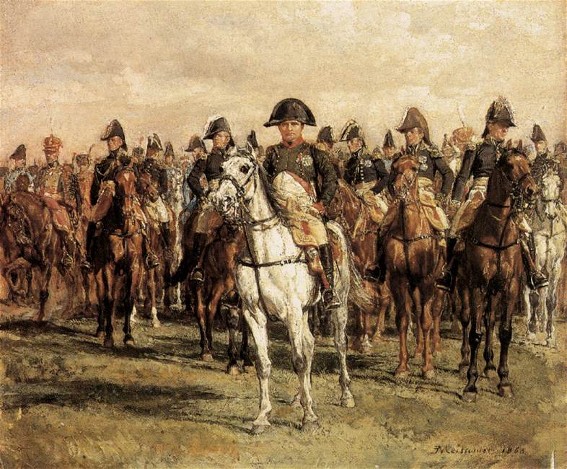Napoleon Bonaparte
Napoleon Bonaparte, b 15 August 1769 in Ajaccio, Corsica, d 5 May 1821 in Saint Helena Island. (Portrait: Napoleon Bonaparte.) French statesman.
Napoleon's government (like those of the 18th-century French kings) took an interest in Ukraine's economic potential, particularly vis-à-vis commerce in the Black Sea ports, and it commissioned several studies on that subject (eg, Essai historique sur le commerce et la navigation de la mer Noire by A. de Saint-Joseph, 1805). Ukraine became a factor in Napoleon's political designs after his vassal state, the Grand Duchy of Warsaw (est 1807), laid claim to the Ukrainian lands that had been a part of Poland before the partition. He did not immediately agree to the Polish claims, but he did not deny them. Ukraine acquired more political significance for Napoleon when he began planning his invasion of Russia. Having received frequent reports from his diplomats and spies in Eastern Europe about antitsarist sentiments in Ukraine and the growth of peasant unrest and pro-French, pro-Napoleon sympathies there, Napoleon requested from his foreign ministry detailed information about Ukraine and scenarios for the dismemberment of the Russian Empire. In 1812 Counts A.-M. Blanc de la Naulte d'Hauterive and J.-G.-M. de Montgaillard submitted memorandums proposing the return of Right-Bank Ukraine (without Volhynia, which Napoleon had promised to Austria for military support in his war against Russia) to Poland, and the creation of two French puppet states in Left-Bank Ukraine and Southern Ukraine that would isolate Russia from Europe and block its access to the Black Sea. One state would have consisted of the territories of Chernihiv gubernia and Poltava gubernia and adjacent lands as far north as Orel, and the other, to have been called Napoléonide, the territories of Katerynoslav gubernia, the Donets River valley, and Tavriia gubernia (including the Crimea).
Because Napoleon's 1812 invasion of Russia was directed at the conquest of Moscow, western Volhynia was the only Ukrainian region occupied by his Grande Armée. There Napoleon's Austrian, Saxon, and Polish allies engaged the Russian Third Army commanded by A. Tormasov. During the Napoleonic invasion Ukraine supplied to the Russian military much of its grain, fodder, and horses, and 22 Ukrainian Cossack cavalry regiments and a huge Ukrainian levy en masse (nearly 75,000 men) fought in the Russian ranks (see Ukrainian regiments in 1812). The Ukrainian gentry, however, organized the levy reluctantly. At their assemblies in Chernihiv and Poltava they resolved to lower the number of recruits from 4 to 1 per 100 inhabitants, and they unwillingly donated money to Russia's military cause. Other Ukrainian notables (eg, Archbishop Varlaam Shyshatsky) even openly supported Napoleon's invasion and were later punished as a result. During the ill-fated winter retreat of Napoleon's army, attempts to penetrate from Belarus into the gubernias of Left-Bank Ukraine were effectively thwarted by Ukrainian forces. The Ukrainian gentry became alarmed at Napoleon's Polish plans and in the end remained loyal to Russia. Napoleon's interest in Ukraine (which prompted the commissioning of Charles-Louis Lesur's 1813 history of the Cossacks) and plans for a second invasion of Russia were laid to rest after the rout of his army by Russia, Prussia, Austria, and Britain in 1813–15 and his forced abdication and exile.
BIBLIOGRAPHY
Borschak, E. [Borshchak, I.]. ‘Napoléon et l'Ukraine,’ Revue des études Napoléoniennes, 19 (July–December 1922)
Lazarevs’ka, K. ‘Kyïvs’ka reiestrova khorohva ta napoleonovs’ki viiny v Evropi,’ Iuvileinyi Zbirnyk na poshanu akad. M.S. Hrushevs’koho, vol 1 (1928)
Borshchak, I. Napoleon i Ukraïna (Lviv 1937)
Butsyk, A.; Strel’s’kyi, V. Velykyi patriotychnyi podvyh (Uchast’ ukraïns’koho narodu u Vitchyznianii viini 1812 r.) (Kyiv 1962)
Volodymyr Kosyk
[This article originally appeared in the Encyclopedia of Ukraine, vol. 3 (1993).]
.jpg)

